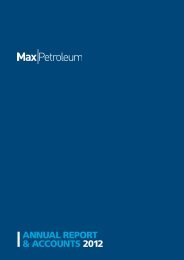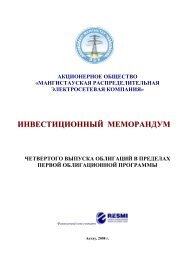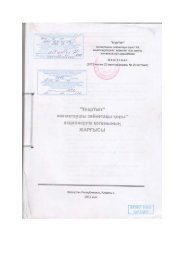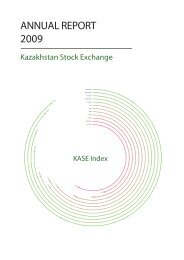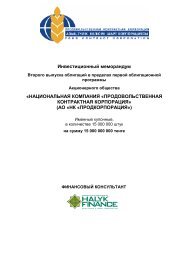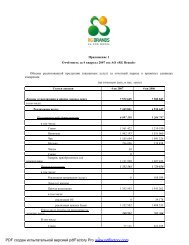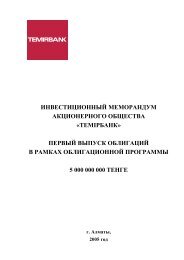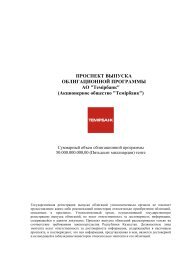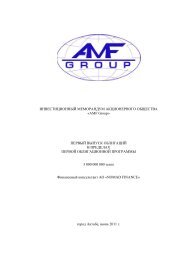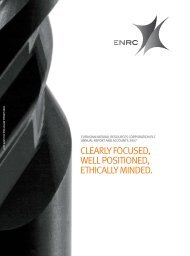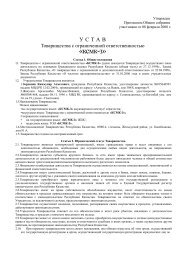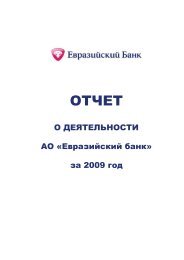JPMorgan - KASE
JPMorgan - KASE
JPMorgan - KASE
Create successful ePaper yourself
Turn your PDF publications into a flip-book with our unique Google optimized e-Paper software.
IMPACT OF NEW AND IMPENDING U.S. GAAP ACCOUNTING STANDARDS<br />
Statement Of Financial Accounting Standards No. 141 (“FAS 141”)—Business Combinations<br />
In June 2001, the Financial Accounting Standards Board (“FASB”) approved SFAS No 141<br />
“Business Combinations” and issued this statement in July 2001. FAS 141 establishes new<br />
standards for accounting and reporting requirements for business combinations and will require<br />
that the purchase method of accounting be used for all business combinations initiated after<br />
June 30, 2001. Use of the pooling of interest method will be prohibited. Management does not<br />
believe that FAS 141 will have a material impact on the Company’s financial statements.<br />
Statement Of Financial Accounting Standards No. 142 (“FAS 142”)—Goodwill And Other<br />
Intangible Assets<br />
In June 2001, the FASB approved SFAS No 142 “Goodwill and Other Intangible Assets”, which<br />
supercedes APB Opinion No 17 “Intangible Assets”. The FASB issued this statement in July 2001.<br />
FAS 142 establishes new standards for goodwill acquired in a business combination and<br />
eliminates amortization of goodwill and instead sets forth the method to periodically evaluate<br />
goodwill for impairment. Management does not believe that FAS 142 will have a material impact<br />
on the Company’s financial statements.<br />
Statement Of Financial Accounting Standards No. 143 (“FAS 143”)—Accounting For Asset<br />
Retirement Obligations<br />
FAS 143, Accounting for Asset Retirement Obligations, is effective for financial statements issued<br />
for fiscal years beginning after June 15, 2002. FAS 143 applies to the legal obligations associated<br />
with the retirement of a tangible long-lived asset that result from the acquisition, construction,<br />
development and/or the normal operation of a long- lived asset, except for certain obligations of<br />
lessees. The Corporation has not yet evaluated the effect that FAS No 143 will have on financial<br />
reporting.<br />
Statement Of Financial Accounting Standards No. 144 (“FAS 144”)—Accounting For The<br />
Impairment Or Disposal Of Long-lived Assets<br />
FAS 144, Accounting for the Impairment or Disposal of Long Lived Assets, supersedes both FAS<br />
No. 121 and the accounting and reporting provisions of APB Opinion No.30. FAS 144 retains the<br />
fundamental provisions of FAS121 for recognizing and measuring impairment losses on longlived<br />
assets. FAS 144 retains the basic provisions of Opinion 30 on how to present discontinued<br />
operations in the income statement but broadens that presentation to include a component of<br />
an entity rather than a segment of a business. FAS 144 is effective for all fiscal years beginning<br />
after December 15, 2001. Adoption of FAS 144 on January 2002 will not have a material impact<br />
on the Corporation’s financial position or net income.<br />
Consolidated Statements Of Income And Deficit Reclassifications<br />
Interest and other income is presented within revenue under Canadian GAAP, under the United<br />
States GAAP this would be presented as a separate line item after operating income.<br />
Interest and financing costs is presented within expenses under Canadian GAAP, under United<br />
States GAAP this would be presented as a separate line item after operating income.<br />
Unusual items as presented under Canadian GAAP would be included within expenses under<br />
United States GAAP.<br />
F-17



